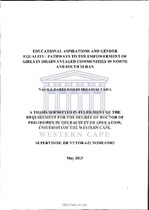Educational aspirations and gender equality: Pathways to the empowerment of girls in disadvantaged communities in North and South Sudan
Abstract
Sudan is one of the countries with a large number of people who move around the
country for safety and better living conditions due to conflicts and the long-lasting war.
These people are referred to as Internally Displaced People (IDPs), and most of them
live in rural areas. The war in Sudan has led to socio-economic deterioration and has
negatively affected social services such as health and education, particularly in the IDP
camps. As a result, children's access to education and the quality of education remains a
great concern. Educational challenges include poor infrastructure, lack of facilities and
teaching-learning materials, overcrowding, and shortage of trained teachers. Illiteracy
rates are higher among women, and drop-out rates are higher among girls. It is
believed that traditional socio-cultural practices are barriers to girls' access to education
in this country.
In light of the above, this study investigates factors that contribute to girls'
construction of educational aspirations in the IDP camps of North and South Sudan.
The girls' educational aspirations are explored concerning gender empowerment
discourses to gain an understanding of how gender empowerment is perceived
and implemented by young females as they move between the school and home
environments. It analyzes the impact of socio-cultural factors on girls' educational
aspirations, perceptions, and self-esteem to understand the significance of
education within a gender empowerment framework in the lives of young girls 10
disadvantaged communities of Sudan.
Through the lens of the Capabilities Approach and various Feminist views, the study
explores how gender discourses in education are understood, and the extent to which
they contribute to building girls' opportunities and capacities in the local context. The study provides an analysis of the girls' opinions of themself and the influence of socio-cultural factors on their inspirational plans and expectations.

